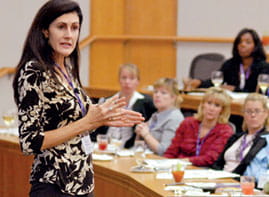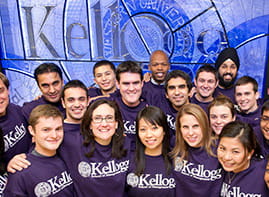Kellogg students gain real-world perspective as Mike Gilliland shares long, strange trip from startup to national grocery chain
4/22/2008 - Entrepreneurship students at Kellogg gained a healthy respect for the challenges associated with the natural foods industry, thanks to insights from one of the organic movement’s pioneers. During an April 21 guest lecture, Mike Gilliland, co-founder and former CEO of Wild Oats Markets, offered a forthright, often amusing, assessment of his 24-year career as a leader in the grocery space.
His journey at times seemed eccentric and improbable, but passion, persistence and some lucky breaks kept Gilliland afloat in the early days, ultimately resulting in him overseeing a billion-dollar public company with 115 stores throughout the United States and Canada, before Wild Oats was sold to Whole Foods Markets Inc. in 2007. Gilliland shared his experiences with students during Professor
Lloyd Shefsky’s Successful Entrepreneurship course.
Starting out in 1979 as the proprietor of a two-person mobile crêpe stand endeavoring to stay a step ahead of the permit police at New Orleans Mardi Gras, Gilliland would run up $75,000 in credit card charges to purchase a tiny Boulder, Colo., grocery in 1984. Through a variety of “strange marketing practices,” including vulgar ads touting cost savings and ads for products (notably Spam) that they didn’t even stock, Gilliland said he created a big buzz for his little college-town store. “We were able to customize it to the market,” he told Kellogg students.
In 1985 he bought another store and named it Lolita’s, after the title of the famous Nabokov novel. This venture nearly went bankrupt, he said, as a result of “trying to be all things to all people.”
By striking up friendships with others passionate about organic foods, Gilliland was able to build success in what he called “a fascinating industry.” Notable among these colleagues was Jirka Rysavy, a native of Czechoslovakia who moved to the United States in 1984 to found Corporate Express, which became a $4.5 billion office products company, and then GaiamInc., a leading eco-friendly lifestyle company. It was Rysavy who in 1988 sold Gilliland Crystal Market, a Boulder health-food store that became the first Wild Oats Market.
“Jirka’s a very brilliant guy,” said Gilliland, adding that Rysavy was living in a spartan cabin in the Colorado woods when he met him.
Gilliland also became friends with businessman and investor Edward Gilbert in 1992 and would soon sell him $1 million of Wild Oats shares. “Eddie made and lost a fortune two or three times,” Gilliland said. “He taught me how to think big and showed me that I needed to expand my horizons.”
By 1993 Wild Oats had attracted $3 million in venture financing and would, over the next decade, transform itself into a $1 billion company. This success, however, was not without pitfalls, which Gilliland detailed for Kellogg students.
When Gilliland stepped down as CEO in 2001, “the wheels had started to come off” the enterprise, he said. Wild Oats had grown, but grown in ways that at times confounded efficiency. There was little uniformity in store layout across the company, and locales were not always chosen as strategically as they might have been. Employees were valued as much for their personality as for any retail ability (and some workers, Gilliland suggested, had an abundance of the former, little of the latter). Then too, management in Boulder often exercised a light tough over regional outlets, resulting in what Gilliland termed “a mishmash of stores” nationwide, each essentially autonomous, running with idiosyncratic marketing strategies.
To try to solve these challenges, Gilliland said he threw himself into the business, spending up to 16 hours each day, an effort his then-wife and Wild Oats co-founder Elizabeth Cook pointed out was garnering only meager results. In the end, Gilliland made way for a more conventional chief executive, Perry Odak, but even leadership changes could not ultimately prevent Wild Oats being sold to Whole Foods.
“We were so chopped up and so diverse, that maybe it was an unfixable company,” Gilliland said, adding that he wished he had enjoyed the benefits of a Kellogg School education to learn the business fundamentals. When he began his career, he said he “didn’t even know how to spell ‘balance sheet,’” and had no idea what a wholesaler was, circumstances that led to his mother making the pasta salad that Gilliland sold in his first store. And when the fledgling grocer ran out of yogurt, someone would run down to the nearby Safeway and buy more, marking up the price to earn a profit. Throughout the “long learning curve,” Gilliland said he remained optimistic. It wasn’t always enough.
“Optimism can be a negative if it prohibits you from seeing the business reality,” he said. “More work is not going to do it. … You need to get some perspective.” He told students that “very few people come with the entire [managerial] skill-set.” Those who don’t must “shore up their shortcomings” by enlisting the help of others with the necessary talent.
Equally important, he said, the company’s leadership must instill discipline and accountability throughout the organization, making tough decisions — something that wasn’t always easy for “sensitive new age guys” to do, Gilliland admitted. At the same time, he emphasized the central value of creating a shared culture and mission that every employee endorses and can articulate. Other insights he gained included borrowing ideas (and often money) from every available source. He also advised “underpromising and overdelivering,” noting that unreasonable expectations can ruin a company.
Gilliland is putting these lessons to work in his latest venture, Sunflower Farmers Markets, a Boulder-based natural foods supermarket that he and Cook founded in 2001. Through a business model whose motto he summarized as “serious food [at] silly prices,” Gilliland said he is trying to capitalize on what he called a “huge middle market” for healthier foods by offering quality at deep discounts. To do so, Sunflower is narrowly focused: It provides a limited assortment of items (three kinds of olive oil, for example, not 12), but these are priced 20 to 30 percent less than Whole Foods, Gilliland said. With an emphasis on fresh produce and private labels, the store is taking a value-driven approach to appeal to a “range of transitional customers,” including those who are mildly interested in natural foods, but who are unable or unwilling to pay premium prices, Gilliland explained.
With 13 stores throughout the Southwest, Sunflower intends to grow organically itself, Gilliland said.
Despite stiff competition and rising food costs — including those associated with ethanol markets — Gilliland remains optimistic, saying that natural and organic products will offer plenty for entrepreneurs to chew on. In fact, he sees the trend for healthy living only growing, as evidenced by large companies, like Kraft, making investments in what used to be considered a quirky market space.
“This is not a fad at all,” Gilliland said in answer to a student question. “We’re over the tipping point.”






